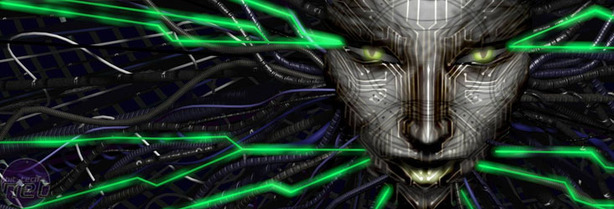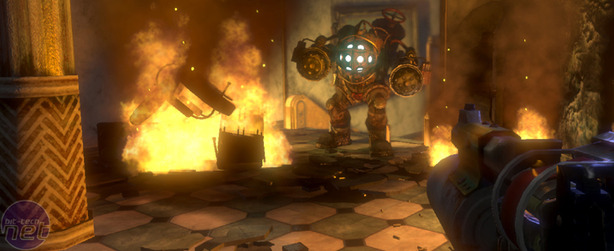System Shock 2 vs. BioShock
System Shock 2 is more often the not the game that gets pulled up in PC vs Console arguments, with PC gamers holding it up as an example of how complexity and player freedom put the PC ahead of the Xbox and PlayStation. We (because I do it too) put all sorts of claims at the foot of this game, which tells of a three-way battle between an alien menace, a volatile AI and the last survivor on the spaceship battlefield. It’s this story which usually soaks up the majority of the glory, along with the number of options open to the player.System Shock 2’s story is interesting in theory obviously, but the vital flaw of SS2 is that it doesn’t really tell it very well a lot of the time. SHODAN, the unstable and malevolent AI who manipulates you throughout the game is a surprisingly strong character who stands clearly above any of BioShock’s cast as something wholly captivating, but other than that what is there in System Shock that isn’t in BioShock?
Well, there are a lot of distractions. The option to journey back through the ship to find chemicals to conduct research with and the bundle of extra content and games contained on your PDA; these are some of the things that fans of the game often bring up as proof that it’s a better game. The arguments sound less convincing when you put the proper labels on them; back-tracking and minigames. BioShock was right to drop those ideas now in the face of an increasingly cynical audience.
The most frustrating thing about System Shock 2 though is that it plunges so whole-heartedly into its clichéd plot of alien parasites taking over a spaceship that it skips over what could have been a much more interesting part of the story; the player themself. In System Shock 2 there’s literally no exploration of who or what you are and SHODAN hogs the limelight greedily, though somewhat deservedly. The entire game rests on SHODAN’s shoulders and when the character falters, as she definitely does in the closing acts and you get the world’s worst boss fight (yes, worse than BioShock’s) then the whole game stumbles with her.
BioShock, which was actually designed by some of System Shock 2’s principal talent, addresses this flaw directly, deliberately and diligently by making the player an active and important part of the plot, not merely a tool for exploring it.
In both games you start with little idea of who you are or what’s going, only that you’re in a rather inhospitable situation, but where the games differ most importantly is in what they do with the protagonist’s character from thereon in. System Shock 2 quickly dismisses player confusion by suggesting that you’ve been locked in a stasis pod after some cybernetic surgery and that you’ve only been woken as a last resort. BioShock meanwhile goes a more difficult and rewarding path, building player assumptions through clever subversion of standard game conventions and then smashing them all down much later on. Wouldn’t you kindly agree?
That’s not to say that System Shock 2’s story isn’t a thoroughly engaging piece of fiction, merely that it primarily works because of the superb, singular performance of the antagonist (as well as some great level design). BioShock’s plot by contast is something that could stand as an interesting piece of literature even if all the interaction and personalities were removed from it. In fact, it’d probably be better that way – neither Fontaine nor Ryan are strong enough to carry the story, unlike SS2’s stuttering she-devil.
Location and setting play a large part in all of this too, of course. System Shock 2’s twin spaceships, the Rickenbacker and Von Braun, are only a semi-interesting environment at best. The endlessly grey décor and long, sterile hallways (punctuated incongruously by unhelpful messages written in blood) are fantastic for building a sense of claustrophobia when you’re being stalked by psychic monkeys, but not for establishing a unique sense of character.
Character though is something which Rapture has in abundance, from the first time you’re funnelled into the underwater expanse under Ryan’s banner – “No Gods or Kings, Only Man” – right through until the close of the game on the assembly lines. The art-deco city is built on the same objectivist principles that eventually destroy it and that tale is writ throughout everything in the game, creating something much more unique than the dragon-infested forests and empty hallways gamers usually see. For an industry that’s founded on technological pioneering and innovation, computer games are usually pretty limited in the areas they try to explore – literally and metaphorically.
It’s interesting too that, while System Shock 2 is the one which tends to hold more credibility in PC crowds and while fans are quick to make claims about the depth of its story, it’s actually BioShock which possesses the real depth. System Shock 2 only vaguely alludes to it’s underlying themes about what it means to be alive and how beings qualify for that label (which is explored both through SHODAN’s rampancy and through the invasion of the parasitic gestalt The Many). BioShock explicitly delves into the economic and social philosophies that drive it, incorporating Ayn Randisms into the backstory and level design pretty blatantly for those who know what to look for.
You can’t tell all of this to hardcore System Shock 2 fans though – and until recently I too would have refuted these arguments. BioShock is too new, too shiny, too pretty, too cartoony and too well-liked by too many people to qualify for the type of rose-tinting nostalgia that people reserve for cult underdogs like System Shock 2. There’s something wrong with being that blindly entrenched in your arguments and, as we’re about to see, it’s not something that’s exclusive to System Shock 2 fans either.

MSI MPG Velox 100R Chassis Review
October 14 2021 | 15:04












Want to comment? Please log in.